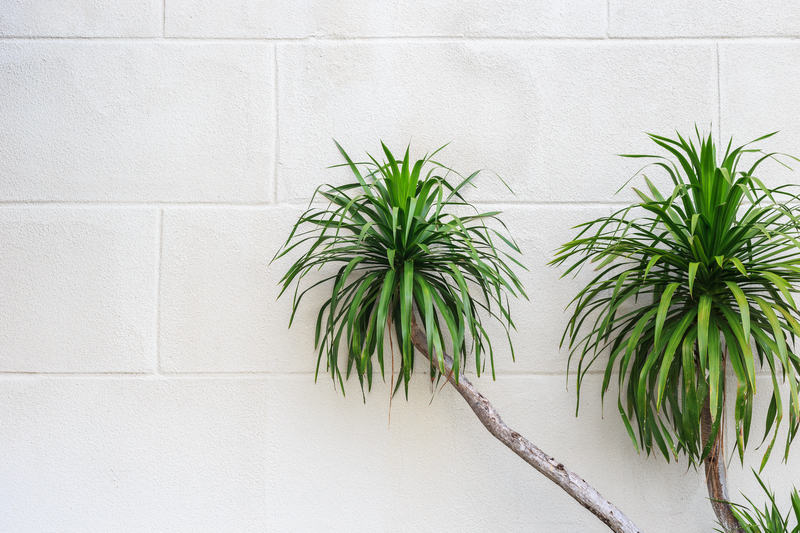Transforming Organic Waste into Gardens' Gold: Nutrient-Rich Soil
Posted on 30/08/2025
Transforming Organic Waste into Gardens' Gold: Nutrient-Rich Soil
Discover how organic waste can be transformed into the lifeblood of a thriving garden. Creating nutrient-rich soil not only enhances your blooms and crops but also supports a healthier planet. In this article, we delve into the process, scientific reasons, methods, and practical steps behind converting kitchen scraps and yard clippings into gardens' gold.
Why Transform Organic Waste?
Did you know that nearly 30% of what we throw away could be composted instead? Organics--like fruit peels, vegetable scraps, coffee grounds, and grass clippings--are often discarded in landfills, where they decompose anaerobically, emitting greenhouse gases. By turning organic waste into nutrient-dense soil, we not only reduce these emissions but also close the natural nutrient cycle, creating healthier gardens and reducing dependence on synthetic fertilizers.
- Reduces landfill waste
- Curbs methane production
- Improves garden productivity
- Fosters soil bio-diversity

Understanding Gardens' Gold: What is Nutrient-Rich Soil?
Nutrient-rich soil, often referred to as "gardens' gold," is a humus-rich medium teeming with essential minerals, beneficial microbes, organic matter, and optimal structure for plant roots. This type of soil is the foundation for robust gardens, supporting vegetable, fruit, and ornamental gardens alike.
The Benefits of Nutrient-Rich Soil
- Increased water retention capacity
- Better root development
- Faster plant growth and higher yields
- Natural pest and disease resistance
- Promotes a healthy, balanced microbial community
- Reduces the need for synthetic fertilizers and chemicals
The Science of Decomposition: How Organic Waste Becomes Fertile Soil
When organic matter breaks down, it undergoes a transformation: Microorganisms such as bacteria, fungi, and earthworms digest the waste, breaking it into simpler compounds. Over time, this decomposition process results in dark, crumbly, and earthy-smelling compost--rich in nutrients like nitrogen, phosphorus, potassium, and micronutrients--which form the essential building blocks for soil fertility.
Key Players in the Composting Process
- Bacteria: The primary drivers, responsible for most decomposition.
- Fungi: Break down tough organic structures like cellulose and lignin.
- Actinomycetes: Specialized bacteria that help decompose harder materials.
- Earthworms and insects: Physical breakdown and further digestion of organic matter.
Methods for Turning Organic Waste into Gardens' Gold
Whether you're a city dweller with limited space or a rural homesteader, there are myriad methods to convert organic waste into high-quality garden compost. Below, we explore proven techniques and their unique benefits.
1. Traditional Backyard Composting
The most common method, backyard composting, involves collecting organic scraps in a pile or bin, managing aeration, moisture, and sometimes temperature to encourage swift decomposition.
- Materials: Fruit & vegetable peels, coffee grounds, eggshells, yard waste, leaves, grass clippings
- Process: Alternate layers of greens (nitrogen-rich) and browns (carbon-rich), keep the pile moist but not soggy, and turn it regularly for aeration.
- Compost is typically ready in 3-12 months.
2. Vermicomposting: Worm Power
Using composting worms (such as red wigglers), vermicomposting is ideal for those with minimal outdoor space. Worm bins digest kitchen scraps and produce worm castings (vermicompost), an incredibly nutrient-dense soil amendment.
- Suitable for indoors or apartments
- Requires worm bins, bedding (like shredded newspaper), and regular feeding
- Results in rich, fine-textured compost in 2-4 months
3. Bokashi: Fermentation Method
Originating in Japan, Bokashi composting uses inoculated bran to ferment organic waste anaerobically. This process is fast (2-4 weeks) and can handle meat and dairy, which traditional composting cannot.
- Requires: Bokashi bins and starter bran
- Ideal for small spaces and urban composters
- The fermented matter is then buried or added to traditional compost piles for further decomposition
4. Sheet Mulching or Lasagna Gardening
For gardeners wanting to prepare beds while recycling organic matter directly, sheet mulching involves layering cardboard, compost, grass clippings, leaves, and food scraps directly onto the soil.
- Suppresses weeds naturally
- Improves soil structure and fertility over time
- Requires minimal turning or effort
Step-by-Step Guide: Creating Nutrient-Rich Soil from Organic Waste
Ready to turn your organic trash into garden treasure? Follow this comprehensive guide to create healthy, fertile soil for your garden beds, containers, or lawn.
1. Set Up Your Compost System
- Select the method that suits your needs and space (see above)
- Choose a location with good drainage and partial shade
- Gather necessary tools (pitchfork, gloves, compost thermometer, etc.)
2. Collect and Sort Organic Waste
- Acceptable Materials: Coffee grounds, tea bags, eggshells, fruit and vegetable scraps, shredded paper, leaves, grass.
- Avoid: Diseased plants, meat, bones, dairy, oily foods in traditional composting (but fine in Bokashi)
- Chop large items to speed up decomposition
3. Build Your Compost Pile
- Add alternating layers of green (wet, nitrogen-rich) and brown (dry, carbon-rich) materials
- Keep the pile moist--as damp as a wrung-out sponge
- Turn or mix the pile every 1-2 weeks to add oxygen
- Maintain a pile size of at least 3x3 feet for optimal heat retention
4. Monitor and Maintain
- Watch for signs of imbalances (foul odors, dryness, pests)
- Adjust greens/browns, moisture, and aeration as needed
- Check temperature if possible (active piles reach 130-150?F)
5. Harvest and Apply Your Compost
- Compost is ready when it's dark, crumbly, and earthy-smelling
- Screen or sift out large pieces for a finer product
- Mix into topsoil for planting beds, containers, around trees, or as lawn top-dressing
Tips for Maximizing Soil Nutrition
- Balance your materials: Too much green = odor; too much brown = slow process
- Add diversity: Compost a wide range of materials for broader nutrient profiles
- Occasionally add a handful of garden soil to introduce beneficial microbes
- Layering different organic wastes ensures a more complete breakdown and richer final compost
The Environmental and Economic Impact of Organic Waste Recycling
Transforming organic waste into nutrient-rich soil is not just beneficial for your garden--it carries profound advantages for the community and the planet.
- Reduces greenhouse gases by keeping organic waste out of landfills
- Diminishes reliance on commercial fertilizers, lowering household costs
- Enhances local soil health and water retention, reducing erosion and runoff
- Fosters community engagement with composting programs
- Supports urban agriculture and food security initiatives
Overcoming Barriers to Composting
While the benefits of composting are clear, some households and businesses face challenges. Solutions exist for common hurdles:
- Lack of space: Consider vermicomposting or community compost programs
- Concerned about pests? Use enclosed compost bins or Bokashi
- Unsure what to compost? Post a list on your fridge
- No garden? Donate finished compost to local gardens or urban farms
Compost Tea: Taking Soil Nutrition One Step Further
For those seeking to maximize the benefits of their homemade compost, brewing compost tea creates a potent, liquid fertilizer for foliar feeding or root drenching. Simply steep mature compost in water (aerated if desired) for 24-48 hours, then apply directly to plants.
- Boosts plant immunity and growth
- Provides quick nutrient uptake
- Can help combat plant diseases organically
Frequently Asked Questions About Organic Waste & Nutrient-Rich Soil
What can I compost at home?
- Fruit and vegetable peels, coffee grounds, tea bags
- Eggshells, shredded paper and cardboard
- Leaves, grass clippings, small branches
- Avoid: Meat, bones, dairy (except in Bokashi systems)
How long does it take to make gardens' gold from organic waste?
- Traditional composting: 3-12 months
- Vermicomposting: 2-4 months
- Bokashi: 4-6 weeks to ferment, plus soil burial time
Can I compost in winter?
- Yes! Although the process slows down, composting continues
- Insulate your pile with straw or leaves for better heat retention

Conclusion: Growing Greener Gardens with Recycled Organics
From the humble banana peel to fallen autumn leaves, organic waste represents a treasure trove for any gardener. By transforming these everyday discards into nutrient-rich soil, we nurture healthier gardens, reduce our ecological footprint, and close the circle of nature's bounty right in our own backyards. Join the movement--turn your waste into gardens' gold, and reap the rewards of lush, fertile earth for generations to come.
Resources & Further Reading
- EPA: Composting at Home
- RHS: Guide to Composting
- University of Minnesota Extension: Composting in Home Gardens
Start your journey today--*transform organic waste into nutrient-rich soil*, and let your garden thrive!
Latest Posts
Effective Strategies for Managing Weed Growth
Discovering the World of Container Gardening
Unleash Your Creativity: Start Your Neglected Garden Makeover



